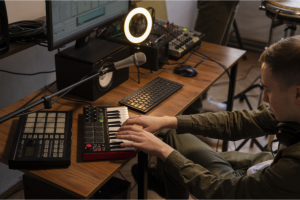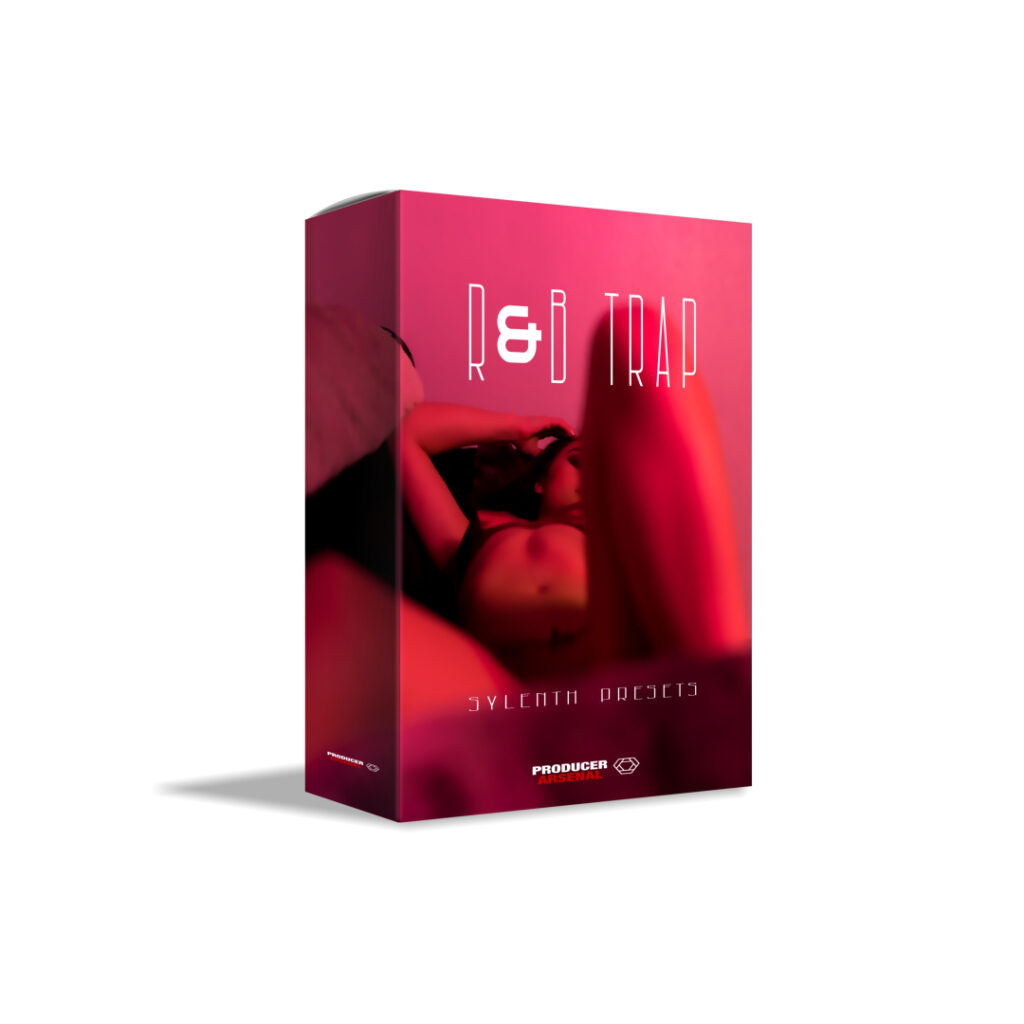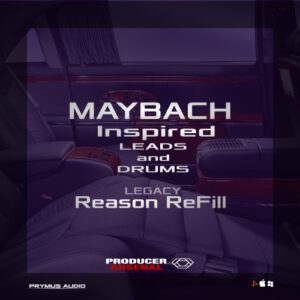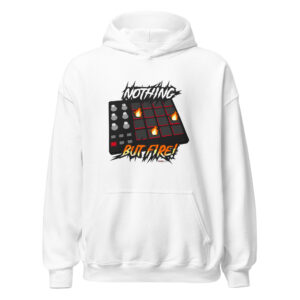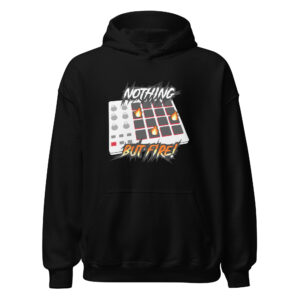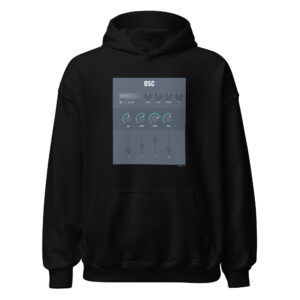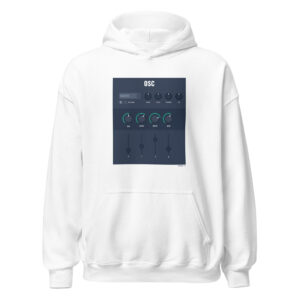Gone are the days when music production was confined to dimly lit bedrooms.
The term “bedroom producer” has become outdated as the digital revolution has transformed the music industry.
Today, the term “producer” encompasses a broader scope, referring to individuals who craft, shape, and bring musical ideas to life.
In this article, we will explore what it means to be a producer, the evolving landscape of EDM dance music, income streams for producers,
the distinct roles of producers, music agents, and beat makers, and the essential steps to embark on a journey as a producer.
What Makes Someone a Producer?
A producer is someone who takes an active role in every aspect of music creation.
They oversee the entire production process, from composing and arranging music to recording, mixing, and mastering.
Producers work closely with artists to capture their vision and create a cohesive sonic experience.
Today, the term “producer” has expanded beyond the confines of a bedroom setup, emphasizing the professional skill
set and creative involvement rather than the physical space where music is made.
How has EDM Dance music changed the industry?
EDM dance music has revolutionized the music industry, breaking down genre barriers and captivating global audiences.
Its infectious beats, energetic melodies have spawned sub genres and been used in the cinema to amplify feeling.
EDM producers have pioneered innovative sound design, incorporating elements of electronic music into various genres.
The rise of EDM has democratized music production, allowing aspiring producers to create and distribute their music more easily than ever before.
How Can Producers Make Money?
Producers have various avenues to monetize their craft:
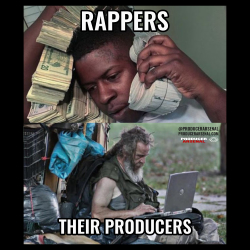
1. Music Sales and Streaming: Selling digital downloads, physical copies, or licensing your music for streaming platforms can generate revenue.
Some streaming sites include Spotify, Apple Music, Tidal, Amazon Music, and Deezer.
2. Performance and DJ Gigs: Producers can showcase their skills by performing live sets or DJing at events, clubs, or festivals.
3. Music Licensing and Sync Deals: Licensing your music for films, TV shows, commercials, or video games can be a lucrative income source.
4. Remixes and Collaborations: Producing remixes for established artists or collaborating with other musicians can lead to financial opportunities.
5. Royalties and Publishing: Registering your compositions with performance rights organizations can earn you royalties when your music is performed or broadcasted.
6. And.. If youre good, You may be able to partner up with us and develop Soundkits and Loopkits and sell with us.
Think you got what it takes? Contact us here If not, it’s all good, read on.
The Duties of a Producer vs. Music Agent vs. Beat Maker:
– A producer oversees the entire music production process, from conception to the final product, working closely with artists to shape their sound.
– A music agent focuses on securing opportunities for artists, such as bookings, endorsements, and negotiations.
– A beat maker primarily creates instrumental tracks, often specializing in a specific genre, which can be used by artists for their own compositions.
Heres a hint, A producer can be all three or the three of them can work together.
What is Needed to Become a Producer? How to Start?
To become a producer, you’ll need:
1. A digital audio workstation (DAW) and basic recording equipment. We will elaborate on this below this section
2. Musical knowledge and proficiency in playing instruments or programming virtual instruments.
3. Sound design skills and a strong ear for mixing and mastering.
4. A passion for music and a willingness to continuously learn and refine your craft.
To start, educate yourself through online tutorials, courses, and resources.
Experiment with different genres, collaborate with other musicians, and build a portfolio of your work.
Networking, attending industry events, and connecting with artists can open doors to opportunities.
Embrace the digital landscape, promote your music through online platforms, and engage with your audience to gain visibility and recognition.
The role of a producer has transcended the confines of a bedroom setup, evolving into a multifaceted creative profession.
EDM dance music has played a pivotal role in reshaping the industry, democratizing music production, and opening doors for aspiring producers.
Basic Recording Equipment:
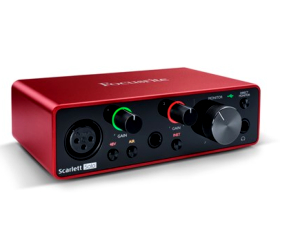
1. Audio Interface: An audio interface is a device that connects your instruments or microphones to your computer,
allowing you to record and process audio. Focusrite Scarlett and PreSonus AudioBox are popular entry-level audio interfaces.
2 .Microphones: Depending on your recording needs, consider having at least one versatile microphone.
The Shure SM58 and Audio-Technica AT4040 are reliable choices for vocals and instruments.
3. Headphones: A good pair of studio headphones is crucial for accurate monitoring and mixing.
Audio-Technica ATH-M50x and Beyerdynamic DT 770 Pro are widely used and provide excellent sound quality.
4. Studio Monitors: While not mandatory, studio monitors provide a more accurate representation of your mix.
KRK Rokit, M-Audio Bx8a and Yamaha HS series are popular options for beginner producers.
5. Cables and Accessories: Ensure you have the necessary cables (XLR, TRS, etc.) to connect your equipment.
6. Pop filter, microphone stand, and shock mounts are useful accessories to improve recording quality.
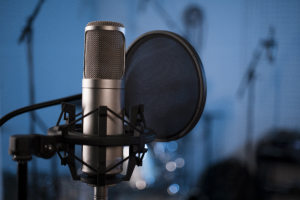
Popular Digital Audio Workstations (DAWs):
1. Ableton Live: Known for its intuitive interface and real-time performance capabilities,
Ableton Live is widely used in electronic music production and live performances.
2. FL Studio: FL Studio (formerly FruityLoops) offers a user-friendly workflow, extensive built-in plugins,
and a robust pattern-based sequencer, making it popular among producers of various genres.
3. Logic Pro: Exclusive to macOS, Logic Pro is a comprehensive DAW known for its powerful editing tools, virtual instruments, and rich sound libraries.
It is favored by many professional producers.
4. Pro Tools: Widely used in professional studios, Pro Tools is known for its advanced audio editing, mixing, and mastering capabilities.
It is a staple in the music and film industry.
5. Cubase: Cubase offers a comprehensive set of tools for recording, editing, and mixing, making it suitable for producers working across different genres.
It provides a professional-grade production environment.
6. Propellerhead Reason: Reason is a versatile DAW that combines a virtual rack of instruments and effects with a timeline-based sequencer.
It offers a unique modular approach to music production and is favored by producers looking for a hands-on, hardware-like experience.
7. Presonus Studio One is a professional digital audio workstation (DAW) that provides a seamless and intuitive environment for music production,
recording, mixing, and mastering with powerful features and a user-friendly interface.
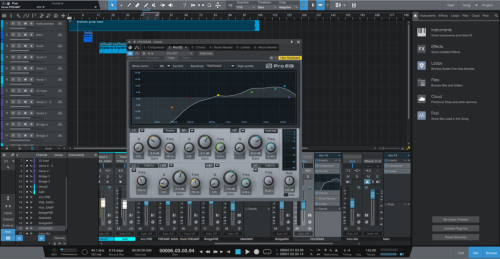
Remember, the choice of recording equipment and DAW ultimately depends on your budget, preferred workflow, and the style of music you wish to produce.
It’s always beneficial to explore demo versions or trial periods of different DAWs to find the one that suits your needs and preferences best.
